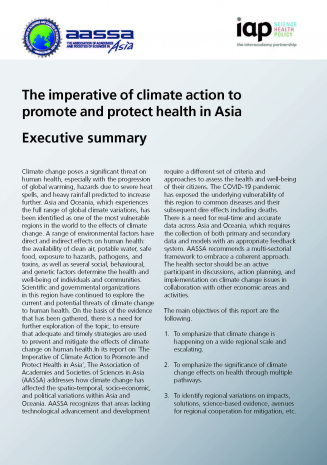Climate change poses a significant threat on human health, especially with the progression of global warming, hazards due to severe heat spells, and heavy rainfall predicted to increase further. Asia and Oceania, which experiences the full range of global climate variations, has been identified as one of the most vulnerable regions in the world to the effects of climate change. A range of environmental factors have direct and indirect effects on human health: the availability of clean air, potable water, safe food, exposure to hazards, pathogens, and toxins, as well as several social, behavioural, and genetic factors determine the health and well-being of individuals and communities. Scientific and governmental organizations in this region have continued to explore the current and potential threats of climate change to human health. On the basis of the evidence that has been gathered, there is a need for further exploration of the topic, to ensure that adequate and timely strategies are used to prevent and mitigate the effects of climate change on human health.In its report on ‘The Imperative of Climate Action to Promote and Protect Health in Asia’, The Association of Academies and Societies of Sciences in Asia (AASSA) addresses how climate change has affected the spatio-temporal, socio-economic, and political variations within Asia and Oceania. AASSA recognizes that areas lacking technological advancement and development require a different set of criteria and approaches to assess the health and well-being of their citizens. The COVID-19 pandemic has exposed the underlying vulnerability of this region to common diseases and their subsequent dire effects including deaths. There is a need for real-time and accurate data across Asia and Oceania, which requires the collection of both primary and secondary data and models with an appropriate feedback system. AASSA recommends a multi-sectorial framework to embrace a coherent approach. The health sector should be an active participant in discussions, action planning, and implementation on climate change issues in collaboration with other economic areas and activities.
The full report is available here.


